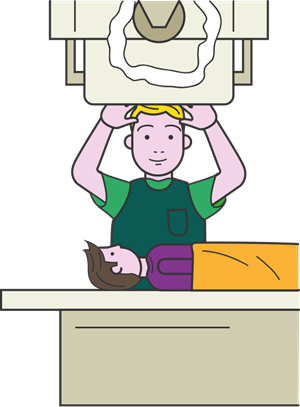Do you like helping and caring for others? Are you interested in science and human anatomy? Do you want to work with technology? Then a career in radiography could be for you!

Radiography is about imaging and radiotherapy and it is one of 15 allied health professions. Allied health professions are distinct from nursing or medicine and provide direct patient care and support services that are critical to the healthcare system.
There are two types of radiographer
Diagnostic radiographers – they diagnose illnesses and injuries;
Therapeutic (or therapy) radiographers – they treat and care for people with cancer.
What makes a great radiographer?
Radiographers work very closely with patients so it’s important to enjoy meeting new people. A great radiographer is:
- Caring and supportive and able to put patients at ease;
- Calm under pressure (for example, dealing with medical emergencies);
- Good at communicating and enjoys working as part of a team;
- Confident working with leading-edge technology;
- Adaptable and has the ability to learn new skills (radiography is constantly changing).
What qualifications do I need?
It’s vital that you choose GCSE options that you enjoy and are good at, but if you are interested in becoming a radiographer, an understanding of science is essential.
Entry requirements for school and college sixth forms vary but you’ll probably need good maths and English GCSE/standard grade passes.
After obtaining A levels/highers or equivalent in science subjects, you need to apply for a radiography degree course, approved by the Health and Care Professions Council and the Society and College of Radiographers.
There are 24 universities around the UK approved to offer diagnostic radiography education and 14 universities approved to offer therapeutic radiography education. Check out the SoR's directory of university courses:
- Directory of pre-registration programmes
- Directory of post-registration courses
I want to study radiography. What do I need to know?
Study is at degree level and full-time only. Most courses are BSc (Hons) which are three years in length, four in Scotland.
You will spend around half of your time working on clinical placement. This means you’ll be learning by working in a real hospital department, with real patients!
Each university course varies but core subjects include communication skills, oncology or digital imaging, anatomy, treatment or imaging techniques, radiation physics and research methods.
Applications for undergraduate BSc (Hons) courses are through UCAS. To find out more about what’s on offer, check out the courses available at the universities that interest you. Go online or ask for a prospectus for more information. Also, feel free to contact the university if you’ve got more questions – they’ll be only too pleased to help you.
There are also opportunities to travel abroad to broaden your horizons and develop your skills even further! Some universities offer the Erasmus international exchange programme so ask the admissions tutor for further information.
A number of organisations offer ‘elective placements’, providing students with unforgettable healthcare and cultural experiences abroad. To find out more, visit Work the World and Global Medical Placements.
See for yourself!
It’s important to explore both disciplines – diagnostic and therapeutic – before deciding which to study. Some departments and centres hold open days for members of the public who would like to be shown round. Why not contact your local hospital's imaging or radiotherapy department to find out whether any open days are scheduled, or whether they'd allow you to visit on another day? It's a great way to get a ‘feel’ for the environment.